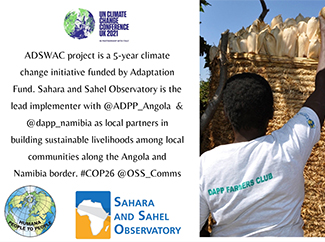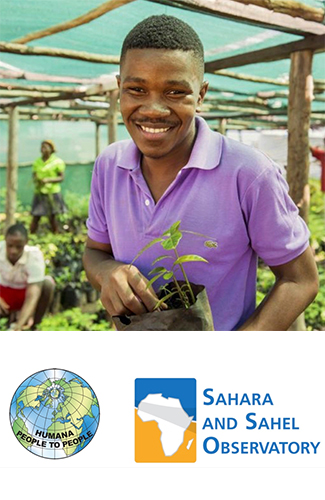consent_cookie
Duración: 1 year
Stores the user's cookie consent state
04-11-2021
Countries pledged under the Paris Agreement, COP21 climate talks, to work to keep temperature rises below 1.5 Degrees Celsius. If the world warms more than this threshold, millions more people in the most vulnerable communities around the globe will suffer from devastating droughts, storms, floods and other impacts of climate change.
According to the International Panel on Climate Change (IPCC) Special Report 2018 report the south-western region of southern Africa will be among the hardest hit, with estimates of increased evapotranspiration caused by the higher temperatures, a significant decrease in precipitation of 10-20%, and increases in the number of consecutive dry days.
We value the urgency of the call for climate adaptation. For the call to deliver it must build on the capacities of people living with the effects of climate change. Climate change adaptation and resilience must be created from the ground up, locally led and facilitated by governments and donors. Communities need political and financial backing to leverage local and indigenous knowledge that supports people-centered adaptation and ensures healthy people, environment and climate.
Climate change knows no borders; neither should our responses. We have used our multi-country presence in Africa, Asia, Central and South America over the years to respond to climate change in various climate action initiatives.
After being informed by the IPCC Special Report 2018, we considered the vulnerability of the communities in the Cubango region of Angola and the Okavango region of Namibia to the harsh effects of climate change and developed a climate change adaptation and sustainable livelihoods project.
We are excited to have our new project approved and ready for implementation anytime soon. The Adaptation Fund,-supported “Resilience Building as Climate Change Adaptation in Drought Struck South-Western African Communities,” (ADSWAC) project will be implemented by an African-led consortium: Sahara and Sahel Observatory (OSS), an intergovernmental organization leading on climate change adaptation in Sahara and Sahel; and two local Non-Governmental Organisations, ADPP Angola and DAPP Namibia.
ADSWAC is a 5-year project that will work to build people and community resilience against effects of climate change. It will promote climate-resilient agriculture and water management, livelihood diversification and access to climate information, knowledge and awareness.
The project will respond to the call by working with 160 local Producer Organizations and 160 Water User Associations along the Angolan-Namibian regional border communities. Okavango River communities in Northern Namibia and Southern Angola will be supported to develop and implement Community Adaptation Action Plans, ultimately reaching 140,000 people.

